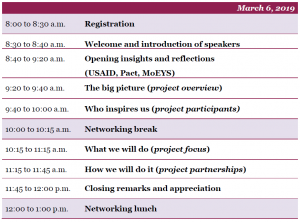WE Act Empowers Women Entrepreneurs
Emerging Markets Consulting (EMC) is supporting Pact Cambodia on the WE Act project that is seeking to help young women entrepreneurs achieve their full potential. Funded by the U.S. Agency for International Development (USAID), this five-year program is focusing on urban-based micro or small businesses and aspiring women entrepreneurs between the ages of 15 and 35. WE Act aims to address key challenges to their businesses through strengthening business skills, expanding their professional network, increasing access to relevant information, financing, mentoring, market opportunities and more.
The role of EMC is to identify suitable areas of collaboration between WE Act and the private sector for the benefit of women entrepreneurs. The goal is to match companies or business organizations and their competences, capacities or commercial interests to the specific needs of the entrepreneurs. This could either mean enabling sustainable B2B relationships with women entrepreneurs as eligible suppliers / customers or to ensure relevant assistance for empowering women entrepreneurs from a CSR perspective. The focus is on creating linkages that will have a long-term effect on women entrepreneurs to grow their businesses sustainably.
To potential partners, Pact can provide technical and financial assistance in different forms, whether it be co-designing a company-own training or support program for women entrepreneurs, capacity building for entrepreneurs to enable them as adequate business partners, co-funding company measures that support women’s business advancement, and more. Through involvement in the project, partners can gain new profitable business relationships, strengthen their CSR profile, increase their brand visibility via co-branding on WE Act project related materials and reach a large audience with their activities.
By supporting young women entrepreneurs, the ultimate objective is to improve their and their families’ living standards, reduce existing gender barriers in entrepreneurship in Cambodia and to empower women by increasing their participation in decision-making processes.
Background
Cambodia is experiencing economic growth – 7% annually – but this growth has not been equitable, leaving women and their economic prospects behind. While women own more than 60% of micro and informal businesses of up to two employees, they own only 18% of small businesses (3 to 9 employees) indicating a huge untapped potential to contribute to the Cambodian economy. The discrepancy points to a big opportunity to comprehensively support the growth of women as economic actors. Women tend to share economic prosperity with their families and communities in ways that drive development in areas beyond livelihoods, such as health and education.


Comments are closed.